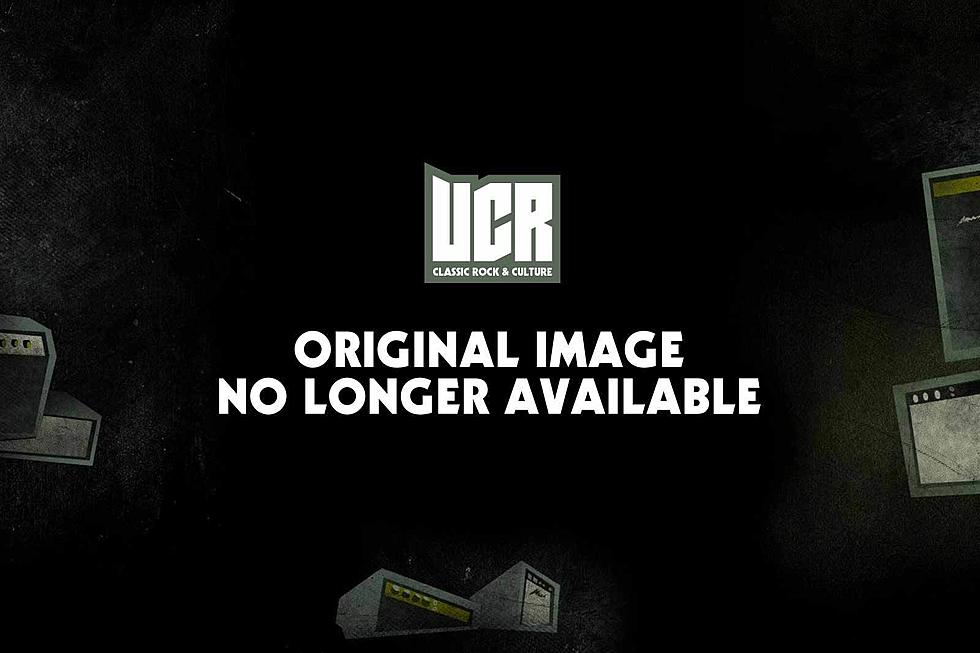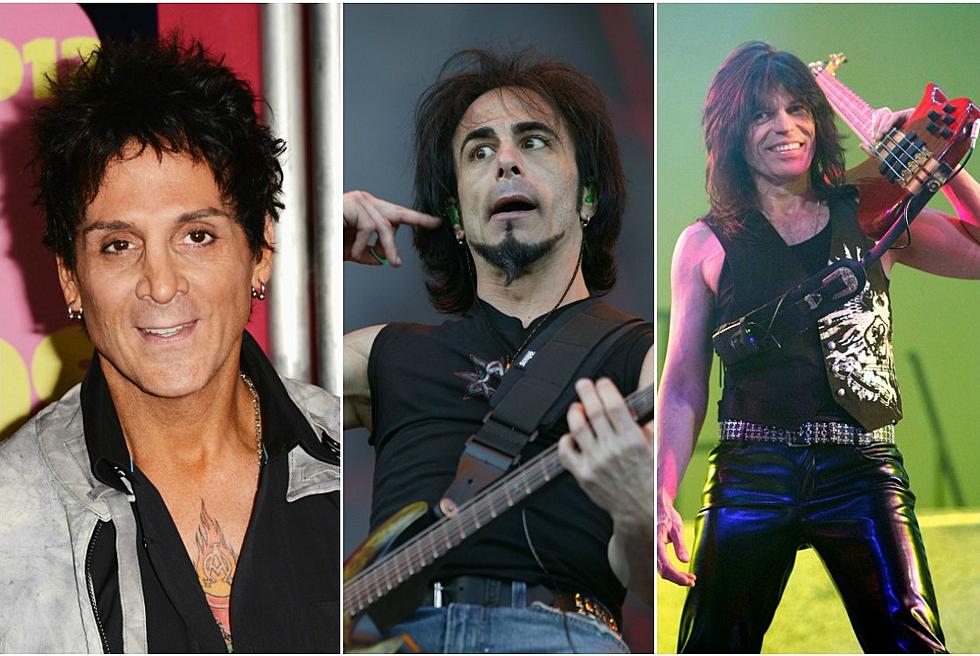
Bassist Rudy Sarzo Discusses the Creation of Animetal USA
Famed metal bassist, Rudy Sarzo, has performed along side some of the greatest rock ‘n’ roll groups in history, playing the role of bassist for bands such as Quiet Riot, Whitesnake, Blue Oyster Cult and of course, Ozzy Osbourne, all of which we brought to you in our previous interview with him. Yet after building up a career that nearly anyone in the music industry would kill to have, Rudy decided to leave Blue Oyster Cult to focus on other projects. In particular, he joined the Japanese-based anime-centric metal group, ‘Animetal USA.’
Comprised of Rudy Sarzo on bass as ‘Storm Bringer,’ Mike Vescera (Obsession/Loudness) on vocals as ‘Metal-Rider,’ Chris Impellitteri (Impellitteri) on guitar as ‘Speed King’ and Jon Dette (Slayer/Testament) on drums as ‘Tank,’ Animetal USA—which is a reincarnation of a past Japanese band ‘Animetal’—performs metal versions of popular Japanese Anime cartoon theme songs. Their shows are anything but usual for the concertgoer. Easily put, it’s a theatrical show. Dressed as characters—not only in costume but also in make up—the boys of Animetal USA give a metal performance that is truly dramaturgical in the sense of metal and entertainment.
Rudy says the art form of anime culturally drives the country. Even in America, after visiting the Anime Expo at the Los Angeles Convention Center, he was able to see just how popular the art is over stateside. He explains that while metal and anime are different on the surface, they are totally and easily homogenized—both being about the freedom of expression at the core.
Rudy was kind enough to speak to Ultimate Classic Rock about Animetal USA and what challenges it provides him as an artist.
Your newest project, ‘Animetal USA’ is really something very unique and interesting.
Yes! At this point in my career that’s what I’m interested in, just very unique projects. We looked at this not only as a band, but it’s really what we call in Japan an ‘entertainment project.’
It really is a metal super group. You all have amazing backgrounds within the industry. How did it form?
It was a very interesting turn of events. Mike Vescera, our singer, he was in Loudness, which was one of the biggest Japanese metal bands ever. He became a fan of anime, which is at the core of what we do. We do metal versions of anime theme songs. Mike was talking with the record company, Sony, and they thought to revisit the concept of Animetal. It was a Japanese band about fifteen years ago who was quite successful and popular, but today they cease to exist. The whole concept [of Animetal] was that it was very near to the fans and the anime culture, having rock bands perform the songs, so they thought to do it again. One of the prerequisites was to be either a fan of anime or, like myself, an animator. I am a 3D animator and also a fan of anime. It’s one of the most inspiring art forms for animation. Another prerequisite was to have some notoriety in Japan, and I had been touring there for over 30 years with Ozzy and so on, so I was the next member to join. With everyone, there’s a real legacy in the group but also a collective love and passion for anime that makes this such an outstanding band.
That entertainment value, the theatrical element that you’ve experienced in this band, is it at all different from your other experiences?
That’s a really good question. As far as the performance goes, it not too far removed from things I’ve done in the past with bands like Ozzy’s. When I was on the ‘Diary of a Mad Man’ tour, we wanted to give the fans their money’s worth, not only musically but also visually. It was very theatrical. And we’re talking about a band that could have just got up there and played music. We were strong musically but it was about going the extra mile. With Animetal USA, you have the total freedom of story telling of anime combined with the total freedom of expression with metal. To me, it’s a perfect combination.
The futuristic element to the show, do you think that adds something new to metal?
I think it has to do more with the total freedom of expression. For example, we were at the Anime Expo in Los Angeles a couple of weeks ago. Prior to that we toured in Japan on an anime-centric tour with another anime band, Jam Project, but our crowd was half metal and half was dressed like anime characters. It was very interesting. Anime was born in Japan. It’s a cultural art form there. I’d be sitting at a coffee shop in Japan and watch people walking by; ethnically, there’s a certain look, it’s Japanese. And each one is individualistic in their passing. Everybody looks different. They have a need to be different from each other because ethnically they’re very similar. They’re Japanese, where as in the United States we are a cultural and ethnic melting pot. You might be standing next to somebody with a different ethnic background than yours. People look different even if they’re wearing the same clothing. But in Japan there’s a need to be individuals. And there’s such attention to detail that it goes beyond a generic look. There’s detail in everything they do: their manufacturing; their art; their fashion. Actually, this record is the most attention-to-detail-like I’ve ever made [laughs]. Every single performance has to be perfect. I’ve never been in a band which was Japanese-centric as far as the label goes. With everyone else, it was a recording that was done for our American or European label. This one is very specific and very different.
That must keep it exciting.
It’s very exciting and always keeps it going to the next level. In order for this band to be significant in Japan we have to adopt a lot of their work ethic. The next record has to be better than before, which makes sense.
The first album did and is doing very well. Within the first 24 hours it hit number one on the metal charts and number two on the anime charts. Were you at all surprised with how quickly that happened?
In a way yes and no. Being an anime-centric release, and anime being such a significant part of the Japanese culture, I am aware how popular it is. With Animetal USA we have to transcend what we usually do with our other groups as far as image. When I play with other bands we go to Japan and do a tour. But with Animetal USA we’re part of a cultural thing. We do their version of ‘Good Morning America.’ We do all the daytime shows. We’re more about the culture than just being in a metal band. Not only do we get into the international charts but also we get into the domestic charts, which is something I’ve never done before.
The album was recently released here in the U.S. Being that anime is so popular in Japan, were you still excited for it to come stateside?
Oh of course! After having such a great response in Japan and doing interviews and meeting all of the anime graphic artists, it was great. They see Animetal USA as an opportunity to bring the Japanese culture and anime as an art form to the rest of the world. We’re, as individuals, well known around the world in the metal community so they kind of made us ambassadors of anime to the metal community.
Were you at all nervous bringing it to the U.S. knowing that it isn’t as culturally driven over here? Or as popular?
No, because anime is popular around the world. We felt there was going to be a fanbase. At the LA Anime Expo, there were like 75,000 people. And I’m not talking about Japanese. I’m talking families, anyone. You name it. It was a melting pot representing anime. It was wonderful to perform for them, which was our first US performance. But to be able to really witness what impact anime has around the world; it was great. One of the cool things about being in this band is if you’re a fan of anime, even if you haven’t heard us, you’ve already heard the songs. So instantly people get into it and start to sing along.
Are you touring in the states at all?
Yes, that’s in the works. We have to be very careful because we want to make sure that every single show can break, not only by the anime community but also by the metal community. So we have to really pick our markets. We can’t just go to places where anime doesn’t have a fanbase. We need to be able to expand the popularity of the band but always go to fanbases for supports and then expanding from there.
Each of you as an individual, having your own fans, do you think that at all helps?
Absolutely. But it’s really interesting because I think anime fans are really protective of their art form. They don’t want anyone taking advantage of it. They want to embrace it. But then metal fans are the same way. You’d be surprised at how many interviews we did with journalists who weren’t necessarily metal fans; they were just anime fans. That was shocking [laughs]. But there’s so much in common in both art forms. They are both about no limits to your imagination.
Do you think most people can see that?
Only if they open their minds. I grew up in an era where even the artwork on a bands album would take my imagination places. To me, anime has the same impact.
More From KLUB Tejano 106.9










